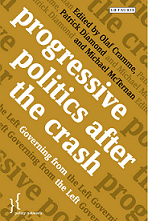Cohen-Setton, J., (2013), “Ordoliberalism and Germany’s approach to the euro crisis”, Bruegel , 16 Σεπτεμβρίου. The debate over the legacy of ordoliberal ideas in Germany’s approach to the euro crisis has gained renewed interests ahead of the federal election, which will be held on 22 September 2013 to determine the members of the 18th Bundestag. Beyond the question of whether a change in government would dramatically change the country’s approach …Read More
Developing the social dimension of a deep and genuine Economic and Monetary Union
László A., (2013), “Developing the social dimension of a deep and genuine Economic and Monetary Union”, European Policy Centre, Policy Brief, 13 Σεπτεμβρίου. Introducing systematic monitoring of key employment and social challenges and strengthening employment and social policy coordination would boost the social dimension of Economic and Monetary Union (EMU). Socio-economic divergence undermines the functioning of currency union, with employment and social crises in individual countries spilling over to others. …Read More
How to make Europe’s incipient recovery durable: End policy uncertainty
Buti, M. and Padoan, P.C., (2013), “How to make Europe’s incipient recovery durable: End policy uncertainty”, www.voxeu.org, 12 Σεπτεμβρίου. The Eurozone is recovering but the revival is fragile – ringed by downside risks. This column argues that three steps – reducing policy uncertainty, repairing the financial system, and creating new investment opportunities – are essential. They could switch the negative confidence-growth feedback loop into a positive one, thus paving the …Read More
End to Crisis ‘Within Sight’ Says Barroso
Norman, L., (2013), “End to Crisis ‘Within Sight’ Says Barroso”, The Wall Street Journal, The Euro Crisis Blog, 11 Σεπτεμβρίου. Europe must move ahead on its banking union project to help the region exit an economic and debt crisis whose end is now “within sight,” the European Union’s top official said Wednesday. In his annual address to the European Parliament, European Commission President José Manuel Barroso said the region has “started …Read More
The way out of the Cyprus economic crisis
Theophanous, A., (2013), “The way out of the Cyprus economic crisis”, Notre Europe – Jacques Delors Institute, Policy Paper 96, Σεπτέμβριος. This policy paper presents the current situation in Cyprus, and proposes two scenarii of a way out of the Cyprus economic crisis: a reframing of the current Troika’s philosophy, or an eventual temporary exit from the euro area. After having analysed the current economic, political and social situation of …Read More
Elections to the European Parliament and the trouble with vox populi
Piedrafita, S., (2013), “Elections to the European Parliament and the trouble with vox populi”, European Policy Institutes Network, No.22, 22 Αυγούστου. Declining support for the European Union in many member states is causing some disquiet about the possibility of an even lower voter turnout in the upcoming European Parliament (EP) elections to be held next May. This discontent might well be exploited by populist anti-European parties and boost protest-vote participation, …Read More
Progressive Politics After the Crash: Governing from the Left
Cramme, O., Diamond, P. and McTernan, M. eds., (2013), Progressive Politics After the Crash: Governing from the Left, London: I.B. Tauris & Co Ltd. Those who hoped the collapse of financial markets would usher in the end of neoliberalism and rehabilitate support for traditional social democratic policies programmes have been disappointed. It is not only the irrationality of markets which is the focus of public discontent, but the inefficiency of …Read More
The Birth of Fiscal Unions
James, H., Siegel, J., (2013), “The Birth of Fiscal Unions”, www.project-syndicate.org, 5 September. Fiscal unification is often an effective way to enhance creditworthiness, and it may also create a new sense of solidarity among diverse peoples living within a large geographic area. For this reason, Europeans have often looked toward the model of the United States. But they have never been able to emulate it, because their motivations for union …Read More
Ireland gets the new Trio Presidency off to a propitious start
Piedrafita, S., (2013), “Ireland gets the new Trio Presidency off to a propitious start”, CEPS Commentary, 28 Αυγούστου. The Irish Presidency of the Council of the EU (January-June 2013) faced numerous challenges, not the least of which was to negotiate the financial framework for the period 2014-2020 and the reform of the Common Agricultural Policy with the European Parliament, together with the pressure to advance the banking agenda. Moreover, the …Read More
What Is European Integration Really About? A Political Guide for Economists
Spolaore, En., (2013), “What Is European Integration Really About? A Political Guide for Economists“, Journal of Economic Perspectives, Vol. 27, N.3, pp. 125-44. Europe’s monetary union is part of a broader process of integration that started in the aftermath of World War II. In this “political guide for economists,” we look at the creation of the euro within the bigger picture of European integration. How and why were European institutions …Read More





